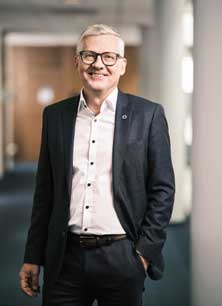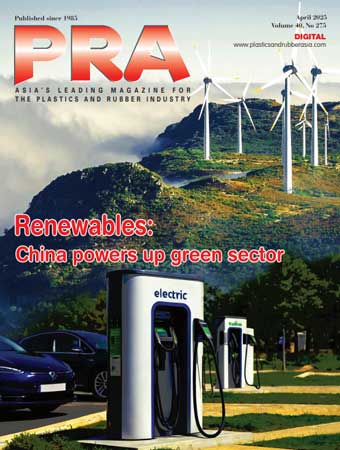K2025: Success of circular economy depends on collective development

In this interview conducted by Germany-based VDMA Plastics and Rubber Machinery group with Manfred Hackl, CEO of Erema Group, in the run-up to the K2025 show in October. Hackl speaks about Erema’s participation at the K show, developments in the recycling sector, cost effectiveness of regranulate, with suggestions for the EU to initiate a CO2 incentive.
VDMA: Erema celebrated its 40th anniversary in 2023. How has recycling developed during that time?
Hackl: If you look back over these 40 years, you will realise that an incredible amount has been achieved in plast ics recycl ing. Today it is technologically pos s ibl e to do things tha t we could not have imagined 40 years ago, 20 years ago or even five years ago. Recycling technologies have developed rapidly. At this year's K, we will once again be presenting many new products, especially solutions that further improve recyclate quality.
We will also be running live recycling together wi th Lindner in the outdoor area. As the largest company in the Group, Erema will be at the centre of our trade fair presence, under the campaign title "Edvanced Recycl ing - Erema Prime Solutions for Advanced Recycling". The chosen spel l ing makes it clear that modern recycling is undoubtedly associated with Erema.
VDMA: Can you give a few examples of the developments?
Hackl: In 2016, the circular economy made its first big appearance at the K fair. A lot has happened s ince then. Nine year s ago, for example, ther e was no rHDPE packaging for food contact, and no household bottles or body care bottles made from post-consumer material.
Supermarket film with recycled content was still qui te a way off back then. All of these now exist , which shows how fast everything has developed.
The interact ion of innovat ive solut ions is still needed to drive plastic recycling forward: the right washing method with the right extrusion, with the right filtration to produce regranulate of the highest quality and odour neutrality.
We have the precise technology to ensure thi s through our group of companies; however, the circular economy will basically only progress if we develop together across the entire plastics value chain.
VDMA: The current economic environment doesn’t look promising. What is the situation in your sector?
Hackl : We all hope that the K will have a positive effect on generating business for companies. I am encouraged by the fact that the EU's Clean Industrial Deal and the Green Deal are very much focused on the circular economy. We are also noticing that the major brand manufacturers and consumers now want to keep materials within the plastics cycle.
VDMA: What is the logic behind the cooperat ion between Erema and Lindner?
Hackl: It is actually more than just a cooperation. We have jointly founded the Blueone Solut ions holding company, in which Erema and Lindner each hold 50% of the shares.
Through the joint venture, we are creating a digitalised and industrialised process from waste to the finished pellet. At K, we will be presenting new solutions and demonstrating that we need to think holistically if we want to achieve the next level of recyclate quality.
VDMA: What needs to happen for recycling to be economical in the long term?
Hackl : The cost-effect iveness of recycling always depends on the price of virgin material. If the price is low, as is currently the case, recycling is more expensive. Comprehensive counter measures are needed here so that long-term planning is possible. How are you supposed to make a plant that has been depreciating over f ive or ten years economically viable if you have to purchase your input, your raw material, at monthly prices, as is the case today?
Instead of a plast ics tax, a CO2 bonus for the regranulate would be desirable. If the positive CO2 contribution of recycled pellets – which is 25 to 30% depending on the application – is tak en into account accordingly, this could contribute to the urgently needed price stability; both would be effective measures.
VDMA: Can this be implemented in practice?
Hackl : I am convinced that something has to be done if we want to promote the circular economy. The whole thing should be initiated by the EU. Then it is quite possible that others will follow suit.
Countries such as India, China, America and many others have already adapted their legislation in the area of the circular economy to comply with EU regulations.
In my view, the EU should once again take on a pioneering role and introduce models such as those just mentioned. We would then have a good chance of being a role model in Europe again.
(PRA)SUBSCRIBE to Get the Latest Updates from PRA Click Here»









